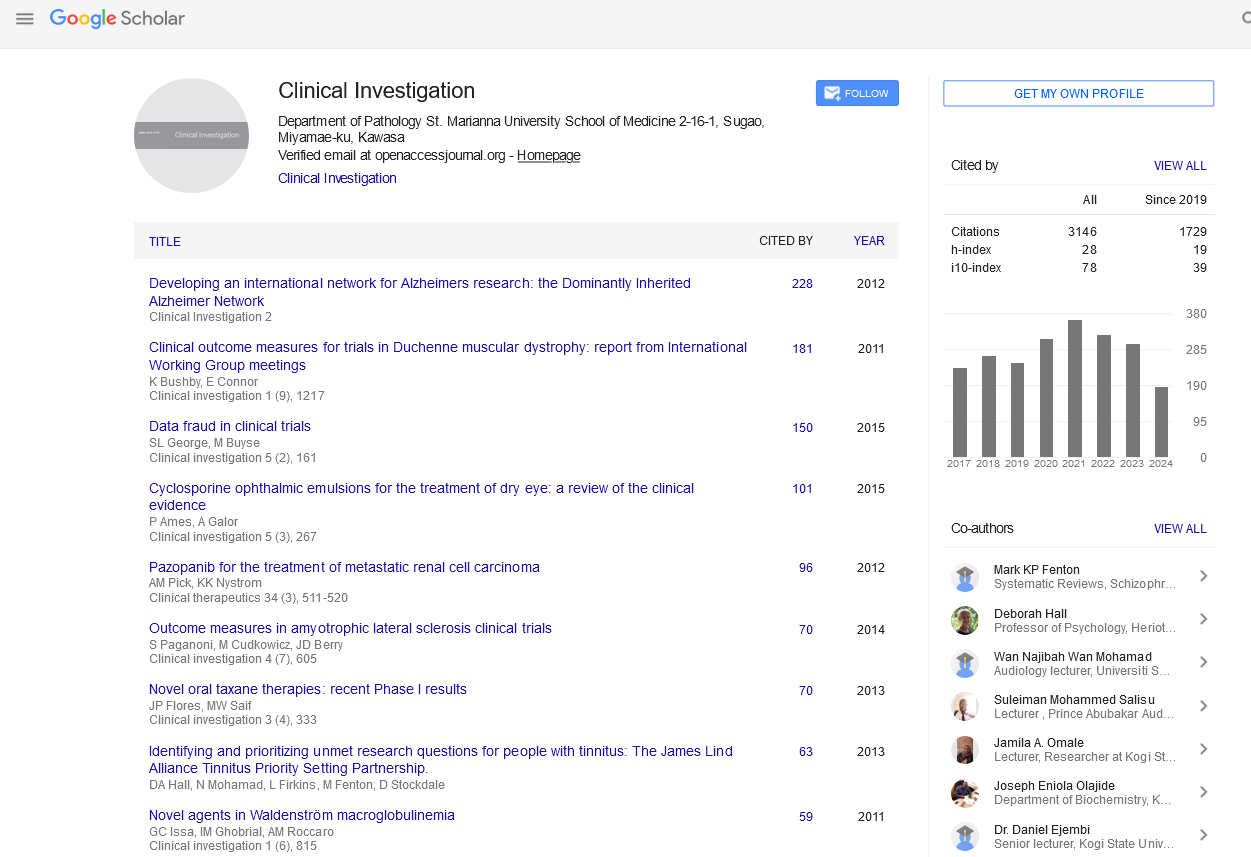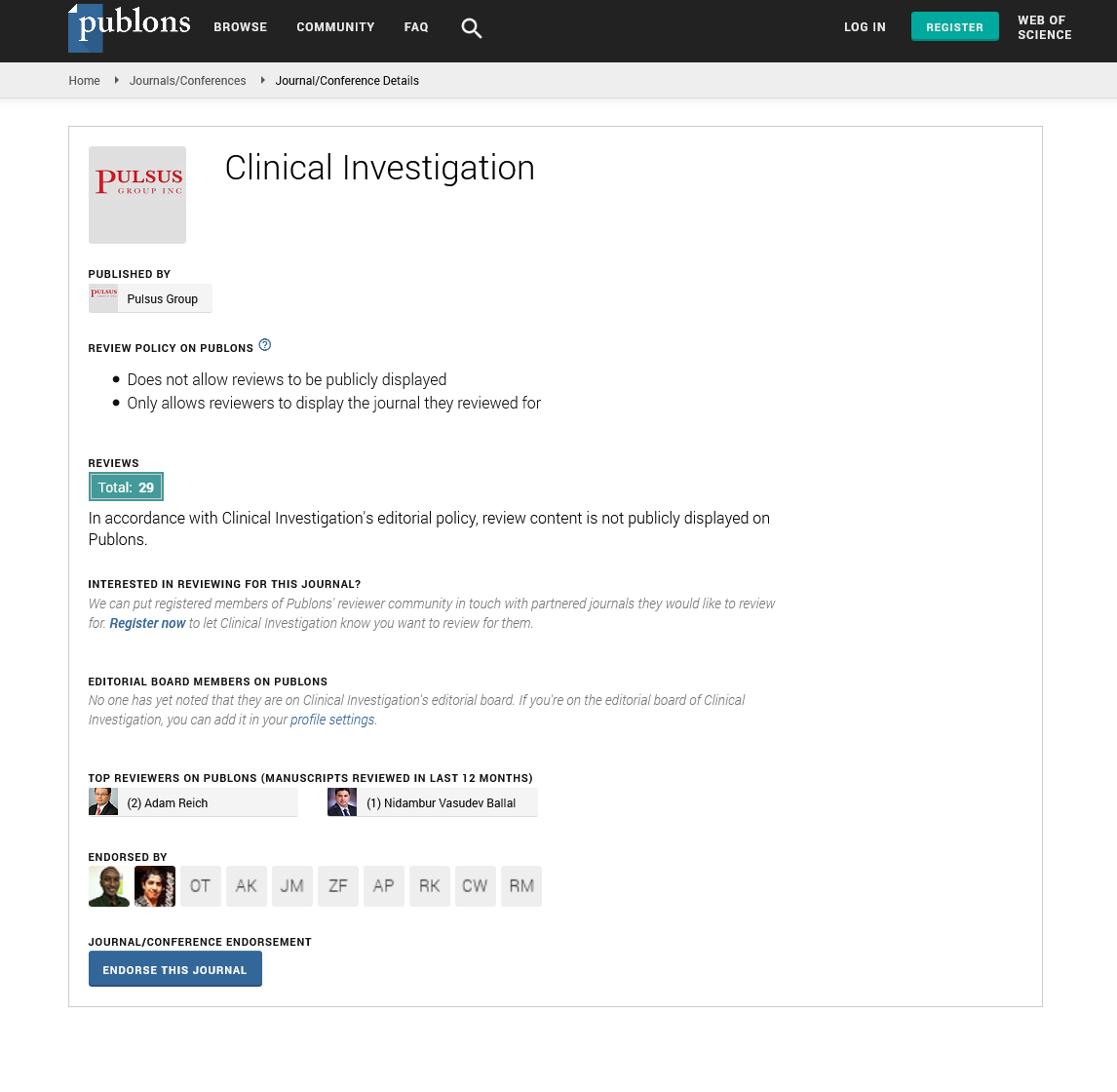Perspective - Clinical Investigation (2024) Volume 14, Issue 2
Transforming healthcare: Navigating the challenges and opportunities
- Corresponding Author:
- Jennifer Keith
Department of Medicine,
University of Arak,
Arak,
Iran
E-mail: keith515@gmail.com
Received: 18-Oct-2023, Manuscript No. FMCI-23-117303; Editor assigned: 20-Oct-2023, PreQC No. FMCI-23-117303 (PQ); Reviewed: 03-Nov-2024, QC No. FMCI-23-117303; Revised: 11-Jul- 2024, Manuscript No. FMCI-23-117303 (R); Published date: 18-Jul-2024, DOI: 10.3752/2041- 6792.2024.14(2).521-523
Abstract
Healthcare is a dynamic and multifaceted field that plays a central role in shaping the well-being of individuals and communities. As societies evolve, so do the challenges and opportunities in healthcare. This comprehensive article explores the current state of healthcare, delving into its complexities, challenges, and the transformative potential of emerging technologies and innovative approaches. From the delivery of medical services to the overarching healthcare ecosystem, we aim to provide a nuanced understanding of the intricacies and advancements in this critical domain.
Keywords
Medical interventions • Exploration • Healthcare • Patient
Introduction
At the heart of neurology lies the enigmatic human brain, an organ of unparalleled complexity. Composed of billions of neurons, each forming intricate connections, the brain serves as the command center for our thoughts, emotions, and actions. Neurologists delve into the realms of neuroanatomy and neurophysiology to fathom the orchestration of this symphony of neurons, seeking to understand the neural circuits that underpin consciousness, memory, and sensory perception.
Healthcare systems vary across the globe, reflecting the diverse needs, resources, and priorities of different societies. From the publicly funded models in countries like the United Kingdom and Canada to the predominantly private systems in the United States, understanding the structure of healthcare systems is crucial for addressing disparities in access, quality, and outcomes. The World Health Organization’s (WHO) health systems framework provides a comprehensive lens through which to analyze and compare the performance of healthcare systems.
Global health faces persistent challenges, including vast health inequalities, the burden of infectious diseases, and the rising prevalence of non-communicable conditions. Socioeconomic factors, access to education, and disparities in healthcare infrastructure contribute to these challenges. Addressing global health issues requires collaborative efforts, innovative interventions, and a focus on preventive measures to build resilient and sustainable healthcare systems.
Description
The integration of digital technologies is revolutionizing healthcare delivery, management, and accessibility. Electronic Health Records (EHRs), telemedicine, wearable devices, and health apps are transforming the patient experience and enabling remote monitoring and personalized care.
Artificial Intelligence (AI) and machine learning are being harnessed for diagnostics, treatment planning, and predictive analytics, offering unprecedented opportunities to enhance medical decision making.
The shift towards patient-centered care emphasizes the active involvement of patients in their healthcare journey. Shared decision-making, personalized treatment plans, and a focus on holistic well-being characterize patient-centered approaches. Healthcare providers are increasingly recognizing the importance of empathy, cultural competence, and communication skills in fostering strong doctor-patient relationships and improving health outcomes.
Preventive healthcare strategies are gaining prominence as a proactive approach to reduce the burden of diseases. Vaccination programs, health screenings, lifestyle interventions, and community based health promotion initiatives contribute to preventing illnesses and promoting overall well-being. Governments and healthcare organizations are investing in preventive measures to create healthier populations and alleviate the strain on healthcare systems.
Mental health is an integral component of overall health, yet it has often been stigmatized and neglected. The growing recognition of the impact of mental health on individuals and communities has led to increased advocacy, research, and the integration of mental health services into mainstream healthcare. Destigmatizing mental health issues, providing accessible mental health services, and fostering a supportive societal environment are critical for addressing the mental health crisis.
The healthcare workforce is the backbone of any healthcare system, but it faces challenges such as shortages, burnout, and the need for continuous skill development. Innovative workforce models, technology enabled training, and prioritizing the well-being of healthcare professionals are essential for building a resilient and sustainable healthcare workforce. Addressing these challenges is crucial for ensuring the delivery of high quality care.
As healthcare evolves, ethical considerations become increasingly complex. Balancing innovation, such as gene editing and advanced biotechnologies, with patient welfare, privacy, and equity is a delicate task. Ethical frameworks guide medical practitioners, policymakers, and researchers in navigating these challenges. Ensuring that healthcare advances are ethically sound is fundamental for maintaining public trust and fostering responsible innovation.
The COVID-19 pandemic underscored the need for robust global health governance mechanisms. Collaborative efforts, information sharing, and coordinated responses are critical for managing pandemics effectively. Strengthening global health governance involves addressing issues of vaccine equity, pandemic preparedness, and ensuring that health interventions are guided by principles of equity and solidarity.
Financing healthcare is a perennial challenge, with questions of affordability, accessibility, and sustainability at the forefront. Countries adopt various models, including public financing, private insurance, and hybrid systems. Striking a balance between ensuring universal access to healthcare services and maintaining financial sustainability requires innovative financing models, transparent governance, and a focus on efficiency.
In conclusion, the landscape of healthcare is continually evolving, presenting both challenges and opportunities. Navigating this complex terrain requires a holistic and collaborative approach that integrates technological advancements, patient-centered care, preventive strategies, and ethical considerations. The path forward involves harnessing the transformative power of innovation while upholding principles of equity, compassion, and sustainability. As we navigate the future of healthcare, it is essential to remain vigilant, adaptive, and committed to the well-being of individuals and communities globally.
Telehealth and remote patient monitoring have emerged as powerful tools in enhancing healthcare accessibility. Especially in rural and underserved areas, telehealth enables patients to connect with healthcare professionals remotely, reducing barriers to access. The integration of sensors and wearable devices allows for continuous monitoring of vital signs and chronic conditions, enabling early intervention and personalized care plans.
Conclusion
Precision medicine, also known as personalized medicine, involves tailoring medical treatment to the individual characteristics of each patient. This approach considers genetic, environmental, and lifestyle factors to customize treatment plans. Advancements in genomics and molecular diagnostics have paved the way for precision medicine, offering targeted therapies that can improve treatment efficacy and reduce adverse effects. The field of surgery is witnessing a technological revolution with the introduction of robotics and augmented reality. Roboticassisted surgery enhances the precision and dexterity of surgeons, allowing for minimally invasive procedures with improved outcomes. Augmented reality provides surgeons with real-time information and 3D visualizations during surgery, enhancing decision-making and procedural accuracy. With the increasing digitization of healthcare, ensuring the security and privacy of patient data is paramount. Healthcare organizations must implement robust cybersecurity measures to protect sensitive information from cyber threats. Compliance with data protection regulations, such as the Health Insurance Portability and Accountability Act (HIPAA), is essential for maintaining patient trust and confidentiality.


